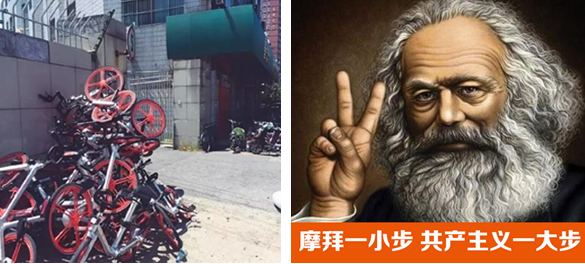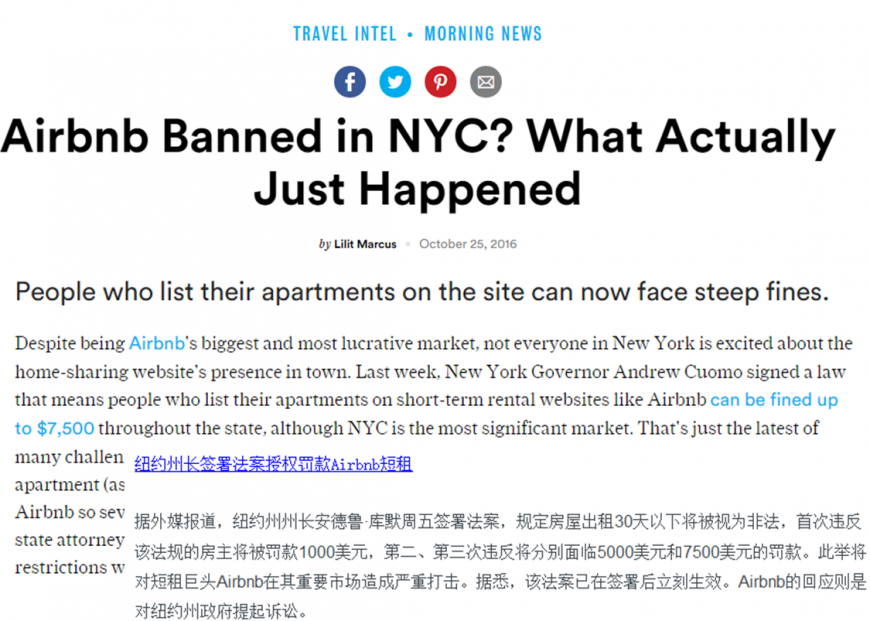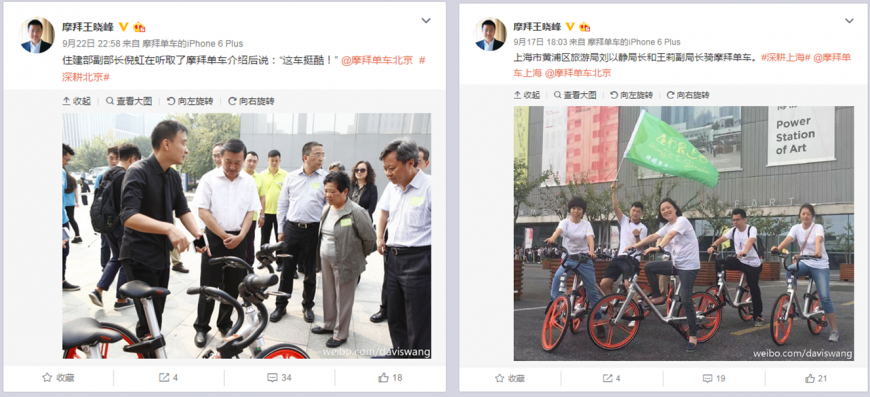Mobike’s Risky Business

Left: A pile of broken mobikes.
Right: Netizens’ take on the well-known Neil Armstrong moonwalk comment to show their affection for mobike. The quote translates to “one small step for mobike, one giant leap for communism”.
By Assistant Professor of Marketing Lin Chen
What are the operational risks faced by mobike, a B2C asset-heavy company for whom operational data that helps it keep track of its bicycles is the most important part of its existence? (See related article “Why mobike is a hit”.)
Theft & vandalism
A mobike bicycle is almost theft-proof. Unlike traditional chain-powered models, mobike’s transmission is shaft-driven. Therefore its parts, if dismantled, cannot be used with a regular bike. In addition, the mobike tire is solid and puncture-proof, while its wheel hub is an eye-catching orange colour, making it virtually impossible to hide the bike.
The downside is that these anti-theft measures have made the mobike a lot heavier than regular bikes. The word “laborious”, was the complaint unanimously made by those who actually rode a mobike.
And though the chances of theft are slim, these high-cost (worth 3,000 yuan each) well-equipped bicycles are not vandal proof. While a mobike is initially designed to last four to five years, 10% of the bikes on the street in Shanghai were already out of use within two months of the service being offered, according to mobike CEO Wang Xiao Feng.
To address the issue of vandalism, mobike has worked with Qian Hai Zheng Xin and Zhi Ma Xin Yong (both credit platform services) to establish a credit system which aims to punish users who deliberately damage bikes or park them illegally. But because the current method of management and meting out of punishments relies on user reports, this can only be a temporary solution. Eventually, there will have to be a system in place that addresses issues such as value estimates, closer collaboration with the traffic police, and a practical way to process insurance claims.
In countries such as Denmark and the Netherlands, where citizens are better educated, the damage and theft of public bicycles is much less than in China. In fact in all major Danish cities there is no fee to park or rent bicycles, something which seems unimaginable in China.
Changing government policies

The Governor of New York recently signed a law that will severely hamper Airbnb’s operations in the city while the Chinese government unveiled policy that will restrict operations of the ride sharing app Didi, the vanguard of a shared economy. So the future of the shared economy seems less than bright. It is safe to say that after the release of regulations for internet car-hailing platforms, there has been a renewed interest – from the capital side – in how companies will deal with risks related to government policies.
But the future for public bike programs is less cloudy. In fact local governments’ attitudes to public bikes seem encouraging, and this has been given full play on Chinese social media. A few examples:

-
Wang Xiao Feng, CEO of mobike, former General Manager of Uber’s Shanghai Branch, posted on WeChat, “A year ago Mr. Liu who was Director of the Road Transportation Department in the Shanghai Municipal Transportation Commission, would often ask me to join him for meetings. He fined Uber as he believed the company’s operations violated administrative regulations. [In contrast], during a recent visit to mobike as head of the Shanghai Road Administration Bureau, he has provided words of encouragement to us and promised to put supportive policy in place.
-
On June 24, Yangpu District Government signed a strategic cooperation agreement with mobike. On July 11, Director of Shanghai Municipal Transportation Commission friended mobike on WeChat. On July 25, the Mobike Parking Spot was built on East Nanjing Road and the Bund. On July 27, mobike posted an essay on its blog titled “What We Talk About When the Vice Mayor Comes”, a play on the popular Raymond Carver book What We Talk About When We Talk About Love.

Other WeChat Moments posts by mobike CEO Wang Xiao Feng include one that has Ni Hong, Deputy Minister in the Ministry of Housing and Urban-Rural Development saying, “What a cool bike,” after being given an overview of mobike’s features. There is also a post of Liu Yi Jing, Director of Huangpu Tourist Administration and Wang Li, Director and Deputy Director of Huangpu Tourist Administration, riding mobikes.
Since it appears that governments prefer public bicycles to internet car-hailing platforms, there is a bold prediction that shared bicycles will eventually end up being provided by the government instead of private companies. But there is little hope of mobike’s biggest competitor ofo, which has Didi Chuxing as a major investor, winning government investment – not after the recently unveiled government policies on car-hailing platforms such as Didi’s.
If mobike manages to obtain financial support and investment from the government, it will not only be better equipped to face ofo in a price war, but as its bicycles become somewhat government property, the police force will need to be more protective of them, thus solving the issue of theft.
As far as policy regulators are concerned, they will have to determine if mobike is a real solution to the bottleneck in supply and demand for short-term travel, if it really eases traffic tension in the subway and bus systems, and if it decreases traffic jams on the road. Before making any of these judgments, they will also have to determine whether people who need to travel a short two-kilometre journey will really choose a mobike over a taxi.
Chinese companies are often criticized for their failure to innovate and their penchant for merely copying ideas from western companies. Now, with the mobike, 100 per cent made in China, free from the guilt of mimicking the US, an innovative internet-related model has emerged.
Mobike has government support in hand, is well-funded, it never moved anybody else’s cheese, it is free from regulatory problems, it is a 100% made in China internet business model that is totally different from that of Alibaba or any other existing models. These are some of the reasons mobike is doing well as it is follows a B2C heavy asset-based platform strategy which helps solve an unmet need. The company has been smart in its decisions so far, though there is still a long way to go to achieve success. I hope that mobike can survive the current challenges and become a robust company, that more people will choose this low-carbon way of travelling, and that more and more budding entrepreneurs of internet companies will follow a uniquely Chinese path to innovation.













